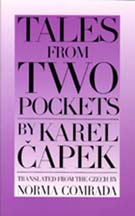Tales From Two Pockets
Translated by Norma Comrada

"One of the great works of the
mystery genre. ...
These haunting, parable-like works reconfirm Čapek's standing
as one of
Czechoslovakia's most intellectually piercing literary
voices."
—Publishers Weekly (starred review; named one of the
Best Books of 1994)
"A tableau greater than the sum of
its parts, one of intelligence and scope and wisdom.
And yet one never has the feeling of reading heavy literature.
The tales are light and fresh ... You can't go wrong with
them."
—Bettina Drew, Chicago Tribune Books (front page
review)
"Čapek's delightfully inventive
tales ... stretch the detective story
to its limits and, in the process, tell us much about the
mysteries of human existence."
—Katherine Ramsland, New York Times Book Review
A row of snowy footprints that stop suddenly in the middle of the
street. A man who looks just a bit suspicious. Codes that need
breaking, handwriting that needs analyzing, cards that need to be
read. People willing to do anything to get their hands on an
oriental rug, a flowering plant, a cactus, the truth. God acting
as a witness while everyone from police officers to juries mete
out justice. Crimes and puzzles, the ordinary and the
extraordinary, humor and humanism. For the first time,
English-language readers can now read all 48 of Karel Čapek's
classic tales, all in a modern translation.
$14.95 paper, $10 e-book, 365 pp., illus., ISBN
0-945774-25-7.
An e-book of Tales from Two Pockets can now be purchased directly from Catbird Press in PDF, EPub, or MOBI (Kindle) formats
for $10.
Payment is via Pay Pal (our Pay Pal e-mail address is catbird@pipeline.com). Include a note in your payment, such as
"Please send a (format name) of Tales from Two Pockets to (your e-mail address)" or send a separate e-mail to info@catbirdpress.com,
which we can respond to with the e-book attached.
Click here to read one of the Tales
from Two Pockets,
a story that is a sketch for the third novel in Čapek's Three
Novels.
Below is an excerpt from another story.
Excerpt from Tales From Two Pockets
"Mystery," he continued, seated in an easy chair and
gazing thoughtfully at the snow melting off the toes of his boots.
"Ninety-nine people of a hundred would've passed by those
footprints and never noticed a thing. And you yourself don't
notice ninety-nine things out of a hundred that are damned
mysterious. We're pig-ignorant about the things of this world. But
some things aren't mysterious. Law and order isn't mysterious.
Justice isn't mysterious. The police aren't mysterious, either.
But every person walking along the street is a mystery, because we
can't get at him, sir. As soon as he steals something, he stops
being a mystery, because we lock him up and that's that. At least
we know what he's doing, and any time we want, we can watch him
through his cell window, right? But I ask you, why do newspapers
print headlines like 'Mysterious Discovery of Corpse!' What's
mysterious about a corpse? When we find one, we measure it and we
photograph it and we cut it up, we know every fiber in and on it,
we know what it last ate, how it died, you name it; and besides
that, we know somebody probably killed it for money. Everything's
clear and straightforward . . . You can pour me some more of that
black tea, sir. All crimes are clear and straightforward, sir; at
least you know the motives and things like that. But what your cat
is thinking, that's a mystery, or what your maid dreams about, or
what's on your wife's mind when she's staring out the window.
Everything's a mystery sir, except criminal cases; a criminal case
is a specified slice of reality with strict definitions, a little
cross-section we can hold up to the light. If I took a look around
me here, sir, I'd get to know all kinds of things about you. but
what I'm doing is looking at the toes of my boots, because
officially we're not interested in you," he added, sipping his hot
tea.
"There's this strange notion," he began again after a moment,
"that the police, especially detectives, are interested in
mysteries. We don't give a damn about mysteries; what interests us
is disorderly conduct. Sir, crime doesn't interest us because it's
mysterious, but because it's against the law. We don't chase
crooks out of intellectual curiosity; we chase them so we can
arrest them in the name of the law. Listen, streetcleaners don't
run around the streets with brooms so they can spot people's
traces in the dust, but so they can sweep and tidy up all the
filth life leaves behind. Law and order aren't a bit mysterious.
Keeping order is dirty work, sir; and whoever wants to keep things
clean and tidy has to poke his fingers into all kinds of nasty
stuff. Well, somebody has to do it," he said despondently, "just
as somebody has to slaughter calves. But slaughtering calves out
of curiosity, that's barbaric; it should only be done as a skilled
trade. When it's someone's duty to do something, then at least he
knows he's authorized to do it. Look, justice has to be as
unquestioned as the multiplication tables. I don't know if you
could prove that every theft is wrong; but I can prove to
you that every theft is against the law, because I can arrest you
every time. If you scattered pearls in the street, then a
policeman could give you a ticket for littering. But if you
started performing miracles, we couldn't stop you, unless we
called it a public nuisance or unlawful public assembly."
 Catbird Homepage | Catbird Specialty Areas | Catbird Authors | Catbird Titles | Catbird Links
Catbird Homepage | Catbird Specialty Areas | Catbird Authors | Catbird Titles | Catbird Links
